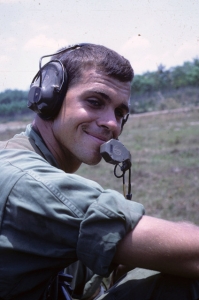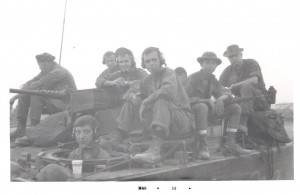
Capt. David R. Crocker, Jr. in Vietnam, 1969
Tuesday, November 11, 1968 was cold and stormy in Connecticut and it was barely light when my father drove my husband, Army Captain Dave Crocker, Jr., and me to a tiny airport in Groton where Dave would board a small prop plane for the first leg of his trip to Vietnam. I was probably not thinking about the fact that it was also the fiftieth anniversary of the armistice in 1918 that marked the cessation of hostilities on the Western front of World War I. Fifty years seemed like more than two generations to me at age twenty-one. My grandfather had fought in the British Army in World War I and he died in 1955, another lifetime ago. Three years in the trenches of France took an unspoken toll on him but he survived for enough years to succumb to the sequelae of the wounds, deprivations and mustard gas he suffered between 1915 and 1918.
Today, November 11, 2019, I’m imagining how my grandfather must have received the news of that horrible war’s end. I’m wondering if he heard the news in the hospital in Malta where he eventually recovered enough to come back to the U.S. and marry my grandmother, or if he was still limping through the freezing mud in France when the Armistice was announced. I was only eight when he died so I don’t think he had the opportunity to advise me about the risks of marrying a soldier going off to war. And, as I’ve heard from many family members of veterans, he didn’t reminisce about the war. Even my father who had survived World War II on a Navy oil freighter in the China Sea said nothing about his fears except that Dave was always in his prayers. 
I think that both my father and grandfather would be happy with how I have handled my experience with war and how I have remembered Dave since his death in Vietnam on May 17, 1969. In this fiftieth anniversary year, I went to Vietnam to see where it happened, and back to the Eiger in Switzerland where his sister and I took his ashes in the summer of 1969.

Ruth Crocker at the Eiger in Switzerland with her memoir about Capt. David R. Crocker, Jr.
Remembering and commemorating doesn’t seem to prevent the eruption of conflicts that result in war and thus the loss of talented people who might have changed the world had they survived. But, it helps those who must go on without them. To the loved ones of lost – and surviving – veterans, I invite you to create your own unique reunions and remembrances as often as you can and for as many years as possible. It may be the best way to keep the memory of them and their sacrifice alive – especially on those other 360 plus days of the year when Veterans are not mentioned on the calendar.
Ruth W. Crocker is the author of Those Who Remain: Remembrance and Reunion After War. She is also an Ambassador for the Military Writers Society of America, an organization that provides writing workshops for veterans and survivors.

A wonderful essay!